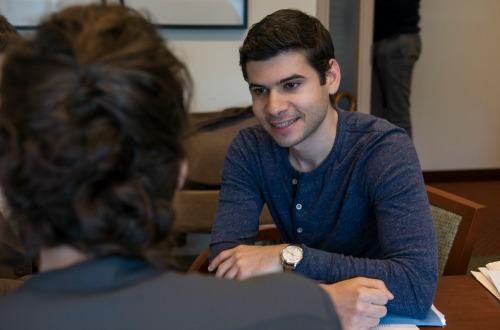Refugee Crisis in Lebanon: A Forgotten Toll of the Syrian Civil War
I spent my summer interning at the U.N. High Commissioner for Refugees (UNHCR) in Beirut, Lebanon. Every morning, I walked through blast barriers and barbed wire, past hundreds of Syrian refugees waiting to register for UNHCR assistance. As the U.S. and its allies begin airstrikes in Syria, those long lines are a lasting reminder of the long-term effects of that war.
Refugees I encountered on my way to work jumped at the chance to question someone they saw as a U.N. insider.
“What is happening with my file?” “When will I be resettled outside of Lebanon?” “Why is everything so slow?”
The Syrian refugee crisis in Lebanon is often overlooked in the American press. But it is one of the most devastating and enduring results of the civil war in Syria.
Syrian refugees in Lebanon have now lived for years in a state of vulnerability, facing a lack of shelter in a country that has banned refugee camps. Families struggle daily to access food, health care, and education. Their difficulties are complex, and the effects are pervasive.
Lebanon criminalizes the very presence of refugees who fail to independently navigate its bureaucracy. Twice a year, every Syrian above the age of 15 must travel to a government registration center and surrender their travel documents for up to three weeks to renew their legal status. The process sometimes takes much longer. It’s an intimidating, costly ordeal, and Syrians are often reluctant to part with their only identification papers. Many refugees find the Lebanese registration process so daunting that they forego renewal completely, dramatically increasing their vulnerability.
Unregistered refugees live under the constant threat of imprisonment or intimidation. Without legal status, they risk detention and abuse at checkpoints any time they travel, cutting many off from work. Unregistered children may be unable to travel to attend school. Parents without status cannot register their newborn children, who become stateless. These long-term systematic vulnerabilities have an enormous impact on the daily lives of refugees.
I was drawn to human rights work after growing up amidst endemic rights violations in Lebanon and Palestine. But as a law student working on refugee issues, the sheer scale of the humanitarian disaster in Lebanon can be overwhelming.
| Bassam Khawaja '15 meets with Professor Sarah Knuckey, director of the Law School's Human Rights Clinic. |
There are now more than 1.2 million Syrian refugees in Lebanon registered with the United Nations. In a small country of 4.5 million, the aid response is termed the largest ongoing humanitarian operation in the world. Still, organizations are struggling, with only 46 percent of the 2014 funding requirements currently met.
Working to protect refugee rights in the country is a complicated undertaking—Lebanon has not ratified the Refugee Convention. Because the Lebanese government does not grant refugee status to Syrians, they face a continuous struggle simply to maintain a lawful presence.
The U.N. is working to improve this process for Syrians. Under the supervision of U.N. attorneys, my role—after months of negotiations, site visits, and meetings with Lebanese officials—was to help write the proposal for a project that would dramatically speed up the renewals. Syrians would no longer need to surrender their identification papers and—in less than a day—would receive a durable ID card that they can use to prove legal status in the country. If the pilot project is implemented and the system is adopted, it could go a long way toward making this part of their lives less burdensome and intimidating, and to ameliorating some of the hardship of displacement.
Bassam Khawaja is a third-year student at Columbia Law School where he is Editor-in-Chief of the Columbia Human Rights Law Review and a member of the Human Rights Clinic. He spent his summer working for the United Nations High Commissioner for Refugees in Beirut, Lebanon through Columbia Law School’s Human Rights Internship Program. He has previously worked with Human Rights Watch and the New York Legal Aid Society and is pursuing a career in human rights law. The views expressed here are those of the author and do not reflect the official policy or position of UNHCR or the Lebanese Government.
